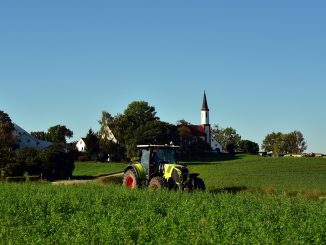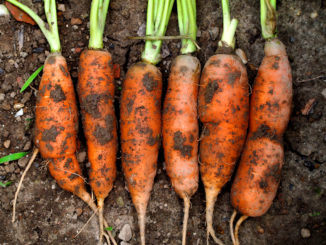
The German Farmers’ Association (Deutscher Bauernverband) promises nature conservation, but acts against it. Jost Maurin (Die Tageszeitung, taz) makes the case that this trajectory could serve as a warning for the EU Strategic Dialogue, in which environmental and farmers’ associations are to develop a vision for the future of agriculture.
Republished from the German newspaper taz.
By Jost Maurin
The German Farmers’ Association (Deutscher Bauernverband, DBV) has repeatedly broken commitments to more environmental protection signed in the “Commission on the Future of Agriculture” (Zukunftskommission Landwirtschaft, ZKL). This roundtable was established by the German Government (Merkel) to find common ground amongst all stakeholders. The DBV signed important demands for more nature and animal protection in the Commission’s joint declaration. In return, environmentalists moderated their criticism of the agricultural lobby.
However, especially since the farmers’ protests last winter, the DBV has gone against the consensus of the expert committee and is fighting to overturn environmental regulations. With success.
This could be a warning for a similar forum at European Union level: the Strategic Dialogue, in which environmental and farmers’ associations are to develop a vision for the future of agriculture by July on behalf of EU Commission President Ursula von der Leyen.
The problem that the ZKL set out to help solve is huge: agriculture is largely responsible for the fact that more and more plant and animal species are becoming extinct. It occupies around half of Germany’s land area. According to the German Environment Agency, the sector is responsible for 13 percent of Germany’s greenhouse gas emissions, including from soil and machinery. Many animals are kept under conditions that most Germans criticise, according to surveys.
This is why the ZKL, made up of 30 major associations of farmers, retailers, manufacturers, consumers, conservationists, animal welfare organisations and leading scientists, demanded in its June 2021 report, for example, that landscape elements that promote biodiversity, such as hedges and tree rows, and fallow land should aim “to achieve a minimum 10 % share of the open landscape”. In Germany, open landscape primarily refers to arable land. The farmers’ association agreed. And lobbied against it.

Promises were broken
The association even campaigned against the already adopted EU rule by which a farmer had to reserve at least 4 percent of his arable land for nature in order to receive direct payments, the most important agricultural subsidies.
When the European Parliament voted in favour of abolishing the rule in April 2024, the farmers’ association expressed its delight; because if farmers are not allowed to produce anything on part of their land, they could lose income. With that, the most important nature conservation condition for the billions in EU agricultural subsidies was dropped.
The lobbying of the farmers’ association and its EU umbrella organisation Copa-Cogeca was so successful that the recipients of agricultural subsidies under the Green Federal Minister of Agriculture Cem Özdemir now have to do even less for the environment than under his CDU predecessor Julia Klöckner. In the last funding period, farmers had to use 5 percent of their fields as ecological focus areas.
By cancelling compulsory fallow land, the EU is going in exactly the opposite direction to the ZKL. The panel of experts wanted to move away from direct payments that are calculated according to the size of a farm’s agricultural area – largely regardless of how environmentally friendly it is. Instead, the subsidies should in future honour “concrete achievements” such as particularly environmentally friendly farming.
However, when asked by taz, Bernhard Krüsken, Secretary General of the DBV, did not recognise any contradiction between the ZKL resolutions and his policy. “The 10% recommendation was based on the entire agricultural landscape, not on the cultivated area,” he writes.
The double standards continue
“That sounds like an excuse to me,” says Professor Sebastian Lakner, agricultural economist at the University of Rostock. “In fact, almost the entire agricultural landscape is used, and fallow land and landscape elements only make up just under 3 percent of it.” This is why mandatory fallow land makes sense in order to achieve the 10 per cent target of the ZKL.
This is not the only broken promise. The ZKL report recommended producing less animal-based food because it harms the climate. However, Farmers’ Association President Joachim Rukwied later spoke out clearly against reducing livestock numbers. The organisation does not want this to be understood as contradictory either. Krüsken claims that the ZKL did not advise “reducing livestock numbers in advance and across the board”. However, the Commission’s report states that due to the climate impact of livestock farming, “to reduce methane emissions, it is thus necessary to reduce both consumption and, consequently, production of foods of animal origin.”
There was already an indication in 2021 of the farmers’ association breaking its word: Association President Rukwied almost never attended the ZKL meetings – even though he was officially a member and all other important organisations sent their heads. Rukwied, on the other hand, was usually represented by one of his deputies, Werner Schwarz. Schwarz has been Minister of Agriculture in Schleswig-Holstein since June 2022 – and no longer plays a role in the farmers’ association. Rukwied now almost always sends a different deputy to the ZKL.
So the duplicity of the agricultural lobby in the ZKL and in real life continues. This was particularly evident in April, when the ZKL recommended financing more animal welfare with the help of higher VAT on meat. If consumers had to help pay for animal welfare premiums for farmers, this should be done by “increasing the previously reduced VAT rate on animal products”, according to the corresponding paper, which the farmers’ association had also agreed to. The ZKL expressly welcomed the fact that the German coalition government had agreed on an animal welfare levy for meat in mid-May 2023.
The big outcry fails to materialise
However, Rukwied explained shortly after the paper became public: “We reject an increase in VAT on the standard rate or an animal welfare cent. The money for the animal welfare reorganisation must come from the federal budget.” It should be clear to everyone that the federal government will not provide enough additional money for animal husbandry in the foreseeable future given the budget situation and the “debt brake”.
“The Bauernverband is playing a double game,” says Martin Kaiser, Greenpeace Germany Executive Board member, who left the ZKL in protest in 2021. Kaiser was disturbed by the fact that the then Agriculture Minister Klöckner discussed the reform of EU agricultural subsidies with Rukwied but not with the Commission on the Future of Agriculture. “What was put on paper in 2021 and what the head of the German Bauernverband is calling for today don’t match up at all,” said the Greenpeace boss.
The environmental organisations, which are still involved in the ZKL today, have toned down their criticism of the farmers’ association and the agricultural lobby, criticises Kaiser. “These associations prioritise efforts to remain in dialogue. We would also sometimes like to see a clear edge in public debates.” There was neither a “huge outcry” from the associations nor from Greenpeace when the EU and the member states cancelled mandatory fallow land. Kaiser had also expected greater protest when the German coalition-government wanted to overturn the subsidisation of fossil fuels for tractors. “We were almost the only ones to say prominently: yes, of course it is fundamentally right to abolish climate-damaging subsidies.”
Jörg-Andreas Krüger, the head of Germany’s largest environmental organisation, the Nature and Biodiversity Conservation Union (Nabu), admitted in the taz newspaper in March that the ZKL had moderated the activists. An ex-employee of one of the environmental organisations involved told the taz: “We were no longer allowed to criticise the farmers’ association once the ZKL had started its work.” The aim was to maintain an “overriding peace” because the leadership hoped to wrest real concessions from the DBV.
Second edition in Brussels?
Even today, there is still dissatisfaction in the Commission on the Future of Agriculture. “The Commission is a deliberate strategy to bind the environmental organisations,” the taz was told by circles within the current Commission. The environmentalists would spend hundreds of hours on results that would not be implemented anyway. “But the farmers’ association can say: We are talking to each other, so please don’t demonstrate now. The Commission keeps the anger of the environmental side in check at management level.” However, “massive public protest” was necessary at the latest after the environmental conditions for agricultural subsidies were softened.
Instead, large environmental organisations are now also participating in a working group at EU level modelled on the German ZKL: the “Strategic Dialogue on the Future of EU Agriculture”, which Ursula von der Leyen opened in January. It is headed by Peter Strohschneider, a professor of German studies who is not a specialist in the field and who moderated the ZKL until the beginning of the year. In addition to farmers’ and industry associations, environmental organisations such as BirdLife Europe and the European Environmental Bureau are also represented there.
Hannes Lorenzen, president of ARC2020, which campaigns for a reform of EU agricultural policy, believes that the forum was only intended to simulate a genuine exchange. “I have told all non-governmental organisations: don’t go there. The farmers’ organisations won’t move an inch. The dialogue was only intended to legitimise the fact that the European Union was dismantling environmental standards in agricultural policy.”
BirdLife Europe and the European Environmental Bureau did not respond to taz’s requests for comment by the editorial deadline.
This article was written as part of an international research project on EU farmers’ associations initiated by the investigative newsroom Lighthouse Reports.
More
Vote For The Future: Good Food Good Farming Campaign Culminates in Brussels Demonstration
“CAP-as-you-wish Instead of Future-Proof Farming and Food Policy”
Where now for the EU Green Deal? Barometer findings unpacked.




